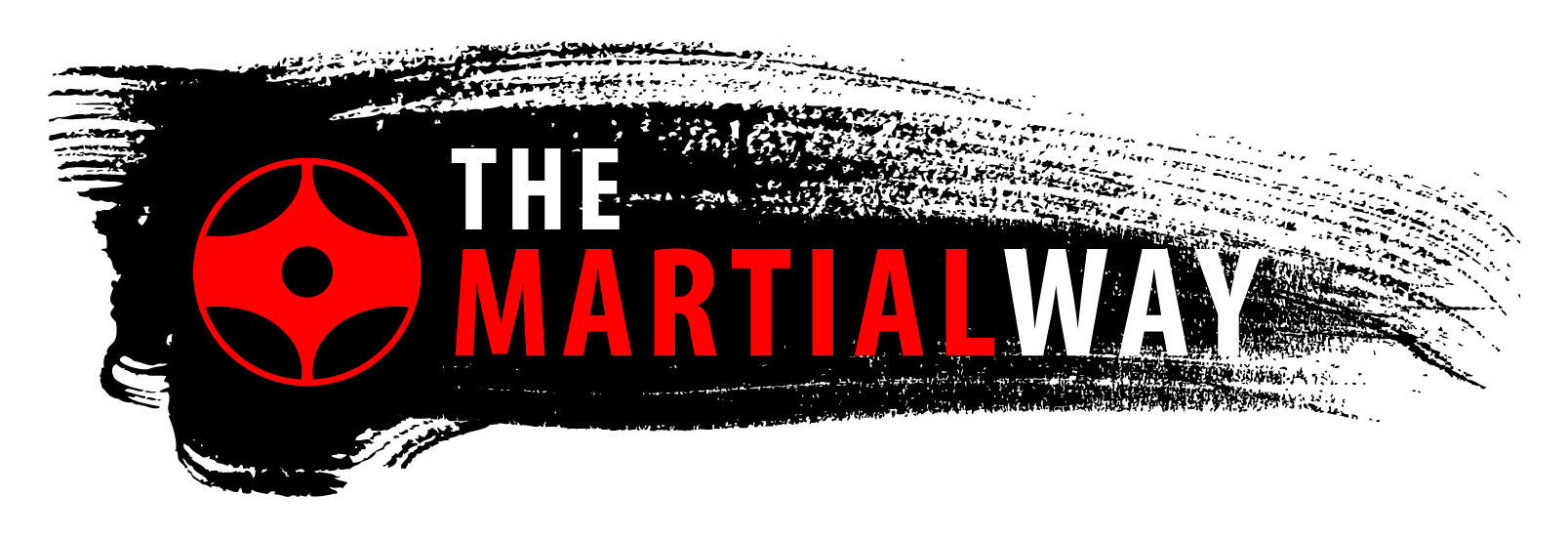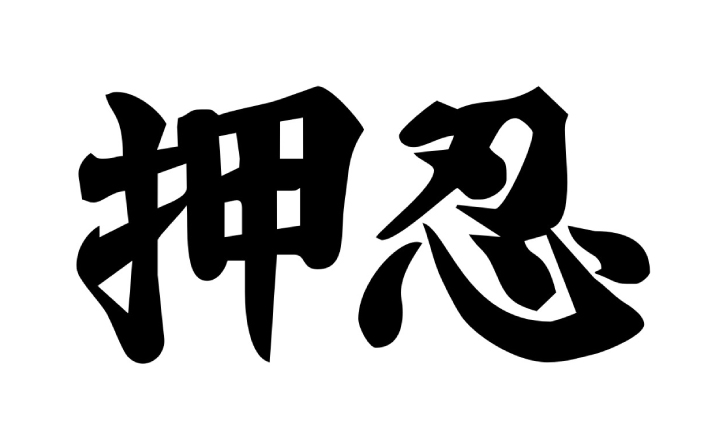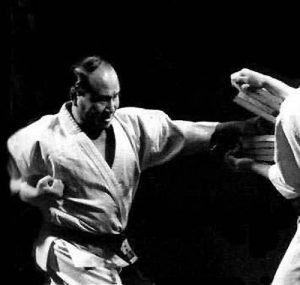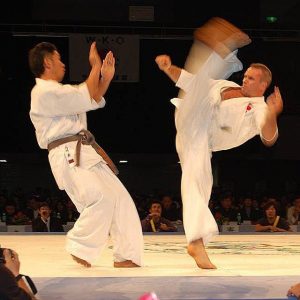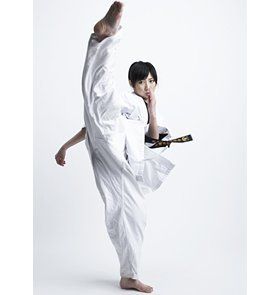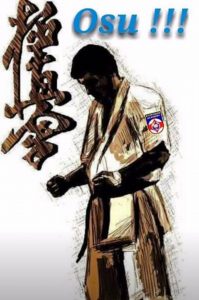What is the origin of the word Osu we always hear in the dojo? There are a few different theories on where it came from, but we do know certainly that it was introduced to the “dojo world” through Kyokushin Karate. Today you will hear it also in Brazilian jiu-jitsu schools, kickboxing etc. But, where did it all start?
The word Osu is pronounced and written in a few different ways. Most write “Osu” or “Oss”. They are just different spellings and both of them are “correct”. The pronunciation is closer to “Ohss!”
There is debate among karateka and scholars about the history of the term Osu, and it’s correct usage. One thing that is known certainly, is that the term did not originate in the birthplace of Karate… Okinawa. It was founded and began use in Japan.
Origin of Osu!
1. One theory comes from Dr. Mizutani Osamu, a sought after language expert and linguistics professor at the University of Nagoya, and his work ‘’Japanese: The Spoken Language in Japanese Life’’. Dr. Mizutani speaks about an experiment with people in returning greetings. He has concluded that ‘’Osu’’ might be a contraction of the more formal expression “Ohayo gozaimasu” which is a very polite way of saying “good morning”. Dr. Mizutani postulates that “Osu!” is a rough expression used by men toward other men, that it means “Hey ya!” in English. However, the jury is still out if this is the reason it was adopted into karate.
2. A second theory says it was invented by the samurai of the Saga clan (佐賀藩 on Kyushu island). Yamamoto Tsunetomo (山本常朝 1659 – 1719), author of the legendary book Hagakure (葉隠), a book about the martial and spiritual way a warrior should live, was born in this clan. He mentions in the book that young bushi (warriors) of the Saga clan in 18th and 19th centuries would greet each other with “Osu!” when travelling to school in the morning.
3. The third theory, similar to the first, is that it is a shortened version of Onegaishimasu [oh-nay-guy-she-mus] translates roughly as “please take care of me” or “I am in your care” or “please have patience with me”. It is very important word used within dojos of Japan, when asking of instruction or help from a senior student or teacher. It is essentially a polite way of saying ‘please.’ Some students of Karate in Japan have been known to use osu as a less formal way of saying Onegaishimasu.
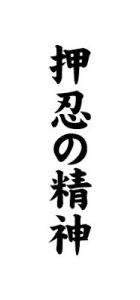
Strength of character that develops through hard training is known as “Osu no Seishin” (Spirit of Osu).
4. Finally, the Kyokushin Karate version states that Osu is a contraction of two words, from a longer phrase known as “Osu no Seishin”. The verb ‘osu’ which means “push”, and ‘shinobu’ which means “to endure”.
押し Oshi meaning “Push”
忍ぶ Shinobu meaning “to Endure”.
Together, these two kanji form a new compound word, which symbolizes “combat spirit”, “the importance of patience, determination and perseverance” “the necessity to overcome all obstacles”, “advancing with a positive attitude”, “not showing pain or exhaustion”. 押忍 It means patience, determination and perseverance and that every time we say “Osu”, we remind ourselves of this.
Whichever theory is correct, we do know that Osu as it is used in Kyokushin Karate essentially means “the spirit of determination and perseverance.”
Judd Reid is well known within Kyokushin Karate. Judd is the first foreigner to have completed the 1000 day “uchi deshi” live-in student program in Tokyo, Japan under Kyokushin Karate Founder Sosai Mas Oyama from 1990-1993. In 2011, Judd Reid completed the 100 Man Kumite, held in Japan. He is a champion in full contact karate and much sought after teacher. I asked Shihan Judd Reid recently his thoughts on Osu and he had this to say:
“I’m actually writing into my book the power of Osu and Kiai. I’m writing a whole chapter on it as it has a huge meaning in karate and the philosophies which teach to persevere and never give up. As to where the origins come from I don’t know. So I’ll give you my brief meaning of Osu. When people start kyokushin karate, or start to go to kyokushin tournaments, their first introduction to karate etiquette and Japanese vocabulary is the word Osu.
Osu is a very powerful word. To me it simply means ‘yes I can do it, I will try my best, I will endure and not give up.’
It’s amazing at tournaments when you here the teacher giving introductions to the student before the fight. All you here from the student is Osu. They answer it loudly and sharply with no hesitation. The fighter installs belief within himself that he will succeed. Osu is a humbling word too. It’s shows respect, loyalty, obedience and trust. There are not many other words like it”. ~ Shihan Judd Reid
When To Use “Osu!”/”Oss!”
There is etiquette obviously in the dojo, and when and how to use Osu is no different. There is debate not only on the origins of the word, but also on when and when not to use it. Jesse Enkamp – The Karate Nerd, did an article on Osu, and while I enjoyed it, and agreed with him that it can be overused, one thing I didn’t totally agree with was his statement “Never say it to a Japanese person – unless he is younger than you, or wants you to say it (and when it comes to women, don’t say it at all.)”.
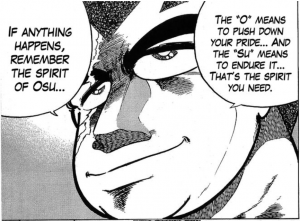 I have many Japanese friends, some of whom are female. I brought this up in conversation with them and their response was that it was nonsense. My very good friend Nori (who is a karateka from Japan) uses the term with me a lot. He is younger than me, but higher in rank. Even when he texts me about meeting for dinner, he will end the text in OSU! For him, he tells me, it is a sign of respect for his friend and fellow karateka.
I have many Japanese friends, some of whom are female. I brought this up in conversation with them and their response was that it was nonsense. My very good friend Nori (who is a karateka from Japan) uses the term with me a lot. He is younger than me, but higher in rank. Even when he texts me about meeting for dinner, he will end the text in OSU! For him, he tells me, it is a sign of respect for his friend and fellow karateka.
My female Japanese friends said they don’t use it, because it is not a common part of Japanese vernacular outside of the dojo. But, they told me that female karateka in Japan freely use it in the dojo and to one another, regardless of gender. In the movie High Kick Girl the character Kei Tsuchiya (played by Shodan Rina Takeda) says Osu! to her Sensei throughout the movie.
You can even see it being used in other popular culture as well. For example on the TV program Iron Chef, Chef Morimoto will say Osu! before a competition.
This all being said, when you use any term over and over again, it becomes programmed into your subconscious. So, even I have responded to people with Osu!, instead of “yes”, like in my workplace, and they have looked at me like I had two heads! However, this isn’t appropriate and the use of the word should be reserved for the dojo, as it is a word that carry’s a lot of respect.
Antony Cummins, an author, historian and TV co-host, who specializes in the ninja of medieval Japan, gave a great vlog on the topic of Osu, which I would highly recommend you watch:
One thing is for certain, I think everyone can agree, if we were asked to describe the philosophy of Kyokushin Karate in a single word, it would be “OSU!”
